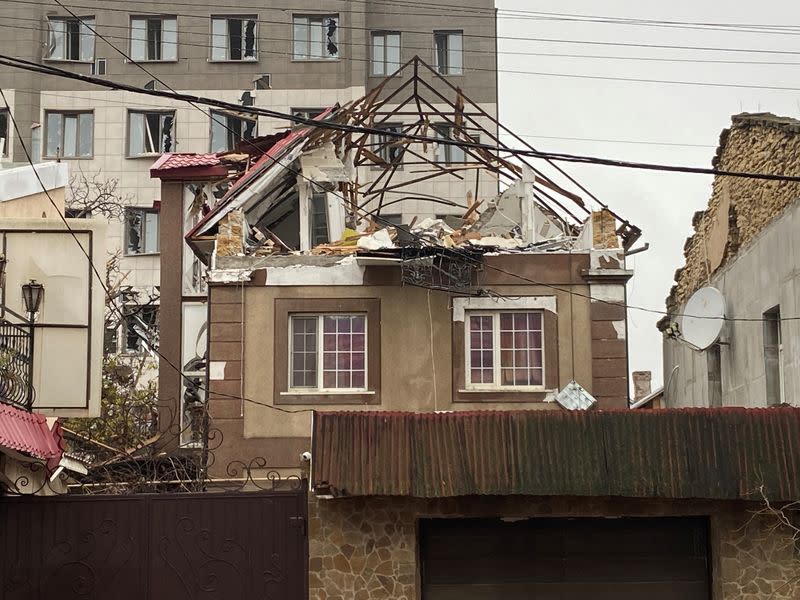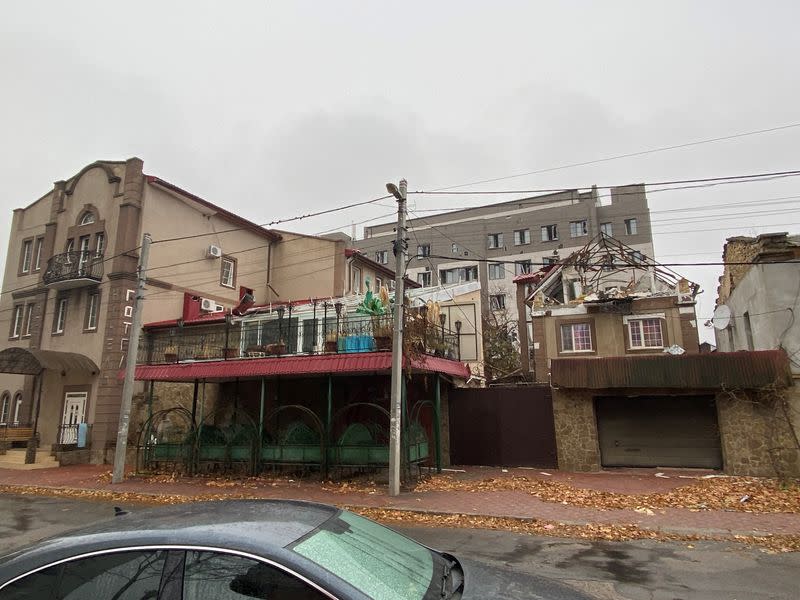How a band of Ukraine civilians helped seal Russia's biggest defeat
By Jonathan Landay and Tom Balmforth
KHERSON, Ukraine (Reuters) - Ukrainian intelligence wanted confirmation last autumn that officers of Russia's Federal Security Service (FSB) overseeing the occupation of Kherson were staying in a small hotel on a back street of the southern port city.
The task was assigned to Dollar: the code name for a civilian who had been secretly providing targeting coordinates and information on enemy operations in Kherson and the surrounding region, the operative said.
Reuters held extensive interviews with Dollar and two other members of the underground partisan network in Kherson after the city was captured in early November.
Their separate accounts provide a rare window into how information and sabotage operations were coordinated with Ukrainian intelligence services behind enemy lines, operations that are still ongoing elsewhere in Ukraine.
While Reuters could not corroborate the specific events they described, two U.S. officials said that such operations by an underground of intelligence operatives, ex-soldiers and amateurs helped hasten Russia's withdrawal from Kherson - one of the biggest setbacks for the Kremlin in a war that marks its first anniversary on Feb. 24.
Dollar, who declined to give his name for security reasons, said he began driving by the Hotel Ninel – Lenin spelled backwards – with his wife, a fellow operative who is part of the network and uses the code name Kosatka, Ukrainian for killer whale.
The gun-toting security men they regularly saw outside the hotel convinced the couple that FSB officers were staying inside; Dollar said he texted his observations to his handler at the Security Service of Ukraine (SBU).
Ukraine's SBU and Russia's FSB did not respond to requests for comment on Dollar’s account or other partisan operations. The defense ministry also did not respond to requests for comment.
Before dawn on Oct. 5, a huge explosion ripped through the hotel, according to Ukrainian media reports and regional lawmaker Serhii Khlan, who wrote on Facebook that two FSB officers and seven Russian military officials died.
"I received an SMS (text) that said, 'Have a look and see how the Hotel Ninel is doing,'" recalled Dollar, who took Reuters to view the shattered hulk. "I went over and reported back: 'There is no more Hotel Ninel.'"
Reuters was unable to review the text message. Dollar and other partisans say they regularly deleted their chats and social media for security reasons.
Dollar and Kosatka received decorations from Ukrainian Defense Minister Oleksii Reznikov inscribed with thanks for "cooperating with the armed forces," according to a photograph seen by Reuters dated Dec. 1 in which the inscriptions are visible. Mart and Kolia, the other two members of their four-person cell, were also decorated by Reznikov, Dollar said.
Asked about resistance operations in occupied territory, an official from Ukraine’s Main Directorate of Intelligence (GUR) said “the local population is supportive,” declining to provide details of specific activities.
Operations to target Russian security personnel and disrupt their plans are continuing across swathes of eastern and southern Ukraine held by Russia and its allies, according to several Ukrainian and Russian-installed officials as well as members of the Kherson partisan cell.
The Institute for the Study of War also says Ukrainian partisan warfare is being waged in Melitopol, Tokmak and Mariupol in the south and Donetsk and Svatove in the east.
Serhiy Haidai, the exiled governor of the eastern Luhansk province which has been under Russian control since last June, said partisans there were conducting sabotage operations there and attacks on suspected Russian collaborators.
In an interview on Jan. 23, he credited partisans with a recent attack on a railway line that Russia’s military was using to transport troops and equipment. He declined to provide further details for security reasons and Reuters could not independently confirm partisan involvement in the attacks.
CAPTURED PARTISANS
Risking arrest, interrogation, torture and death, partisans in Kherson hung Ukraine's blue-and-yellow national colors on trees and relayed Russian positions on Google Earth and other online maps to Ukrainian security officials, Dollar said.
Vitalyi Bogdanov, 51, a regional council member, said that during the eight-month Russian occupation, he collected and relayed to law enforcement authorities in Kyiv information later used to launch investigations into suspected collaborators.
"We were able to start a very big number of criminal cases," he said. He declined to provide further details because the investigations were ongoing.
Kolia, part of the 4-member Kherson cell, said that the group was told by its handlers not to use firearms because information was a more potent weapon.
Other partisans took up arms.
Alexei Ladin, a lawyer in Russian-occupied Crimea, told Reuters he was defending two Ukrainians held there, accused by the FSB of violent attacks against the Russians.
Pavlo Zaporozhets served in the Ukrainian army from 2014-17 and joined Ukraine's GUR military intelligence during the occupation of Kherson, Ladin said.
Zaporozhets was arrested while attempting to attack a Russian military night patrol and faces up to life imprisonment on charges of international terrorism, Ladin said.
He said Zaporozhets was being held in a detention facility in Simferopol and that he and his client attended a preliminary court hearing in the Russian port city of Rostov-on-Don by video link on Feb. 2. The court ordered Zaporozhets' transfer to a facility in Rostov, Ladin said.
According to an FSB account seen by Reuters, Zaporozhets, then 31, was arrested in Kherson by FSB officers on May 9 carrying two grenades, a fishing line and two plastic bottles that he had made into homemade bombs.
Zaparozhets told his questioners he was contacted by a Ukrainian GUR handler codenamed Optium and agreed to carry out his orders for 30,000 hryvnias ($800) a month, according to the FSB case documents seen by Reuters.
Ladin said the FSB account was based on testimony obtained when his client was tortured during questioning and showed Reuters a copy of a handwritten note from Zaporozhets dated from last August in which he described being beaten and subjected to electric shocks while in custody.
While some details about the FSB account were true, Ladin said, the FSB falsely accused Zaporozhets of deliberately targeting civilians as well as the night patrol. The military action was meant to be carried out during the curfew with intention of avoiding civilian casualties, Ladin said.
Ladin said the "optimal solution" would be an exchange of Zaporozhets and another client, Yaroslav Zhuk - who was arrested in Melitopol in June and accused of setting off a home-made bomb - for Russian POWs held by Ukraine. Zhuk denies attacking civilian targets, Ladin said.
The FSB has declined to recognize Zaporozhets as a Ukrainian serviceman eligible for a prisoner swap, saying they could not verify a document presented by the defense confirming his status, Ladin said. In the case of Zhuk, Ladin says his client is a combatant covered by the Geneva convention; the FSB has not accepted the designation.
Reuters was unable to speak to the two detainees directly.
FLEEING KHERSON
Dollar, Kolia and Mart – another member of the cell - said they felt compelled to resist the Russian takeover of Kherson because there was no organized defense of their city when the Russians attacked on Feb. 24.
Dollar and Mart’s first overt bid to confront the Russians came on March 1, they said, when they drove a truck loaded with concrete blocks toward the Antonovskiy Bridge, a main entry point to the city, aiming to slow Russia's advance.
They turned around because they feared the invaders already were in the city, they said.
Dollar considered his options: organize a civil disobedience movement, take up arms or gather intelligence.
Friends put him in touch with an SBU officer. Dollar and Kolia, who were old friends, agreed to collect and relay information on the Russians and build a network of retired police officers, former SBU officials, pensioners, and others, they said.
Kolia, a seasoned hunter who knew the Kherson countryside, solicited information from local villagers, including an elderly woman who would count Russian convoys as she milked her cow.
Between reconnaissance forays, the pair would meet sources in a coffee shop to gather intelligence.
Over the summer one farmer gave Kolia the position of a Russian truck-mounted missile launcher known as a Tochka-U around the village of Muzykivka, about 12 km (7.5 miles) north of Kherson. Dollar said he passed on the information.
The next day the farmer reported to Kolia that there was only a hole in the road where the truck once stood, Dollar said. Reuters could not independently confirm the attack.
Dollar's wife, Kosatka, recruited her own network of informants, he said. Kosatka declined to comment for this story.
THE AIRPORT
At the same time, Mart pursued an independent intelligence gathering effort, visiting people living near the Kherson International Airport in Chornobaivka on April 10 and urging them in person and over Telegram chats to send him information about Russian troop movements. He codenamed his five-person cell Miami. Reuters did not view the chats, which Mart said he deleted.
Russian forces in March had established their headquarters within the three-square kilometre airport complex, which was repeatedly bombed by Ukrainian forces.
Kyiv said large numbers of Russians soldiers were killed, including at least two generals, while aircraft and ammunition stores were also destroyed. Moscow withdrew its military hardware in October.
As Russian losses mounted, some members of the cell Mart had recruited grew over-confident and began taking greater risks, said Mart and Dollar.
When the Russians arrested four of the Miami members at the end of August, Mart feared they would give him away. Reuters was unable to determine what later happened to the four members.
Mart fled to Vasliyevka village in Zaporizhzhia province, the only checkpoint where Russians allowed Ukrainian civilians to cross into Ukrainian-controlled territory, and then made his way to Kyiv.
Despite the liberation of Kherson, Dollar said he and Kosatka would continue aiding the resistance until Ukrainian troops recover Crimea, where the couple owns an apartment.
"The end of the war for me will be when I move back into my apartment," he said.
(Reporting by Jonathan Landay and Tom Balmforth; Editing by Mike Collett-White and Suzanne Goldenberg)

 Yahoo Movies
Yahoo Movies 

